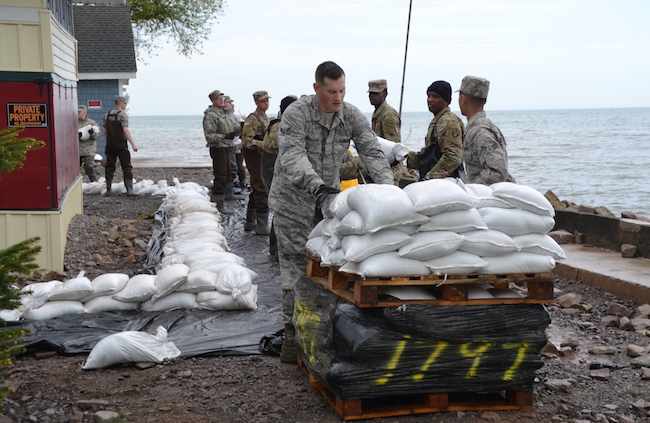Jacobs urges release of more water from Lake Ontario this winter, to stave off spring flooding

Photo by Tom Rivers: Members of the National Guard stack sandbags near houses along Lake Ontario in Carlton in this photo from June 2, 2019. This spot is the peninsula near Kuckville.
Press Release, Congressman Chris Jacobs
Congressman Chris Jacobs (NY-27) has called for increased outflows from Lake Ontario to protect lakeshore communities from the devastating flood damage they experienced over the past several years.
In a letter to the binational entity charged with managing outflows, the International Lake Ontario – St. Lawrence River Board (ILO-SLRB), Jacobs asked the board to allow increased flows from the St. Lawrence Seaway as was done during the winter 2020 season.
“Our shoreline communities have suffered from economic and property damage caused by severe flooding for years now,” Jacobs said. “As we continue to work toward long-standing and more permanent solutions, increasing the outflows now could provide critical temporary relief in the interim. Furthermore, the on-going COVID-19 pandemic has created extensive economic, community, and government response challenges – taking action now to prevent severe flooding will ensure those hardships are not amplified in lakeshore communities.”
The International Lake Ontario-St. Lawrence River Board (ILO-SLRB) was created by the International Joint Commission (IJC) in its 2016 Order of Approval. The Board’s primary responsibility is to ensure Lake Ontario outflows meet requirements set forth by the IJC’s Plan 2014. Previously the ILO-SLRB was permitted by the IJC to deviate from Plan 2014 outflow requirements from May 2019 through June 2020. Jacobs has asked that the ILO-SLRB operate under the winter 2020 deviation rules for the upcoming season.
Recently, Jacobs joined other members of the New York Congressional Delegation in calling for the IJC to present a strategy for mitigating high-water levels. In addition, the lawmakers asked that the IJC provide an update on its ongoing review of Plan 2014 – after its implementation communities saw record high water levels and severe flooding in 2017 and 2019.





































































